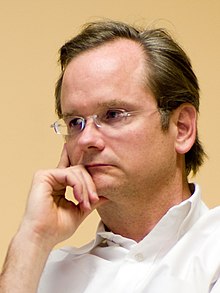Sun
24
Jun
2012
John Ciardi - A Brief Biography
From Dr. Mardy's Quotes of the Week
On June 24, 1916, John Ciardi was born to Italian immigrants who had
settled in the "North End" section of Boston, Massachusetts. After losing
his father in an automobile accident at age three, he was raised by his
barely literate mother and three older sisters. He became interested in
poetry as a young child, and that early interest deepened when his family
moved to suburban Boston (Medford). He first began to show signs of
poetic genius while studying at Bates College in Lewiston, Maine. He
transferred to Tufts University, graduating in 1938, and did graduate
study at the University of Michigan (he published his first volume of
poetry in 1940, a year after getting his M.A. degree).
Wed
20
Jun
2012
More Paraprosdokians
"In one case described in the report, Eliezer "Boy" Billanes, a community leader in the Philippines who campaigned against a new copper and gold mining project, was shot dead by two unidentified men riding a motorcycle whilst buying a newspaper."
Wow - sure a hard way to buy a newspaper (and they shouldn't read whilst driving!!!).
Mon
18
Jun
2012
Galápagos Tortoise Tragedy: Zoo Love Affair Ends after 115 Years
Mon
18
Jun
2012
Rodney King Dies
Rodney King (victim of L.A. police beating was 47) Dies.
Sun
17
Jun
2012
06/17/2012 Article to Read
The magic people plant that hides in dense forests
 The expensive ginseng is sold in
The expensive ginseng is sold in
bundles at a Fusong market.
Raymond Zhou / China Daily
My biggest discovery in Fusong, Jilin province, was that its ginseng looks nothing like the kind of ginseng I previously knew. It's so leafy that it can look
like a carrot.
Sat
16
Jun
2012
Disagreements in Rio+20 Negotiations
15 JUN 2012: SHARP DIVISIONS EMERGE
AS RIO+20 NEGOTIATORS SEEK CONSENSUS
With the United Nations Rio+20 summit on sustainable development set to open next Wednesday, negotiators from developing nationswalked out of a key working group over disagreements with wealthier nations about funding environmentally responsible development and the transfer of green technology. As negotiators attempted to forge an agreement, the G77 bloc of developing nations, led by China, proposed that wealthy countries finance a global fund for sustainable development with an initial annual budget of $30 billion. But European Union nations said they were unable to afford that because most EU states faced an economic crisis. Luiz Alberto Figueiredo, of the Brazilian Foreign Ministry, rejected that argument, saying, “We cannot be held hostage to the retraction resulting from financial crises in rich countries.” As 130 world leaders (with the notable absence of the leaders of the U.S., Britain, and Germany) prepared to arrive, a top Brazilian diplomatlamented the summit’s disparate blocs, saying the traditional north-south divide was only one of many divisions.
Fri
15
Jun
2012
06/15/2012 Article to read aloud
China to open service sector wider
By Bao Chang
China will further open its service and trade sectors, facilitating market access for competitive industries including transportation, construction and travel in the global market, a Ministry of Commerce official said on Thursday.
Thu
14
Jun
2012
Unconventional Education

Date: Tue, May 15, 2012 at 3:35 AM
Subject: delanceyplace.com 5/15/12 - unconventional education
In today's excerpt - an unconventional approach to education:
"In 1999 the Indian physicist Sugata Mitra got interested in education. He knew there were places in the world without schools and places in the world where good teachers didn't want to teach. What could be done for kids living in those spots was his question. Self-directed learning was one possible solution, but were kids living in slums capable of all that much self-direction?
Thu
14
Jun
2012
Paraprosdokian Headlines
A.Word.A.Day with Anu Garg
There's a well-known (and possibly made-up) newspaper headline:
Teacher Strikes Idle Kids
Wed
13
Jun
2012
1910 Ford Model R

Here are some statistics for the Year 1910:
The average life expectancy for men was 47 years.
Fuel for this car was sold in drug stores only.
Only 14 percent of the homes had a bathtub.
Only 8 percent of the homes had a telephone.
There were only 8,000 cars and only 144 miles of paved roads.
The maximum speed limit in most cities was 10 mph.
The tallest structure in the world was the Eiffel Tower!
The average US wage in 1910 was 22 cents per hour.
The average US worker made between $200 and $400 per year.
A competent accountant could expect to earn $2000 per year.
A dentist $2,500 per year, a veterinarian between $1,500 and $4,000 per year, and a mechanical engineer about $5,000 per year.
More than 95 percent of all births took place at HOME.
Ninety percent of all Doctors had NO COLLEGE EDUCATION!
Instead, they attended so-called medical schools, many of which were condemned in the press AND the government as 'substandard.'
Sugar cost four cents a pound.
Eggs were fourteen cents a dozen. Coffee was fifteen cents a pound.
Most women only washed their hair once a month, and used Borax or egg yolks for shampoo.
Canada passed a law that prohibited poor people from entering into their country for any reason.
The Five leading causes of death were:
1. Pneumonia and influenza
2. Tuberculosis
3. Diarrhea
4. Heart disease
5. Stroke The American flag had 45 stars.
The population of Las Vegas , Nevada was only 30!
Crossword puzzles, canned beer, and iced tea hadn't been invented yet.
There was no Mother's Day or Father's Day.
Two out of every 10 adults couldn't read or write and only 6 percent of all Americans had graduated from high school.
Marijuana, heroin, and morphine were all available over the counter at the local corner drugstores.
Back then pharmacists said, 'Heroin clears the complexion, gives buoyancy to the mind, regulates the stomach and bowels, and is, in fact, a perfect guardian of health'.
Eighteen percent of households had at least one full-time servant or domestic help.
There were about 230 reported murders in the ENTIRE U. S. A.!
I am now going to forward this to someone else without typing it myself. From there, it will be sent to others all over the WORLD -- all in a matter of seconds!
Try to imagine what it may be like in another 100 years.
Wed
13
Jun
2012
Arctic Ice: The Other Recession
from Sierra Club
Arctic Ice: The Other Recession
Florian Schulz photographs the wildlife at the top of the world
Photography by Florian Schulz, from To the Arctic | Text by M.P. Klier
What follows is a series of 10 very beautiful pictures
Enjoy.
Tue
12
Jun
2012
Inappropriate Grammar Rules
From delanceyplace.com 4/26/12
Excerpt from
You Are What You Speak: Grammar Grouches, Language Laws, and the Politics of Identity
Tue
12
Jun
2012
Yutyrannus Huali, Tyrannosaurus Rex Relative, Was Largest Feathered Dinosaur Ever
From AOL
By: Jennifer Welsh, LiveScience Staff
Writer
Published: 04/04/2012 01:18 PM EDT on LiveScience
 First Posted: 04/05/12 10:58 AM ET Updated: 04/05/12 10:58 AM ET
First Posted: 04/05/12 10:58 AM ET Updated: 04/05/12 10:58 AM ET
A newly discovered titanic tyrannosaur is the biggest feathered dinosaur yet, reaching up to 30 feet (9 meters) long and weighing more than 3,000 pounds.
Tue
12
Jun
2012
Quotes La to Lz

Lawrence Lessig
born June 3, 1961
American Professor and Activist
We are on the cusp of this time where I can say, "I speak as a citizen of the world" without others saying, "God, what a nut."
Tue
12
Jun
2012
Quotes Ia to Iz
Lee Iacocca
October 15, 1924 - ...
Automobile Executive
In a completely rational society, the best of us would be teachers and the rest of us would have to settle for something less, because passing civilization along from one
generation to the next ought to be the highest honor and the highest responsibility anyone could have.
Mon
11
Jun
2012
Bat Tongue: Tube-Lipped Nectar Bat's Tongue Is Longer Than Its Body
From Huffington Post
By: Life's Little Mysteries Staff
Published: 06/09/2012 12:01 PM EDT on Lifes Little Mysteries
A team of explorers for the National Geographic Channel has captured never-before-seen footage of the tube-lipped nectar bat, a peculiar species discovered in 2005
in the cloud forests of Ecuador. The bat is camera-worthy thanks to one attribute in particular: its incredibly long, wormlike tongue.
Sun
10
Jun
2012
Quips and Quotes: Famous Verbal Exchanges

Thomas Reed Vs. Henry Clay
Sun
10
Jun
2012
'Planet X?' Odd Orbits In Solar System May Mean Unseen Object, Astronomer Conjectures
From The Huffington Post
Posted: 05/22/2012 5:44 pm Updated: 05/25/2012 4:14 pm
By: Natalie Wolchover
Published: 05/22/2012 12:54 PM EDT on Lifes Little Mysteries

A planet four times the size of Earth may be skirting the edges of the solar system beyond Pluto, according to new research. Too distant
to be easily spotted by Earth-based telescopes, the unseen planet could be gravitationally tugging on small icy objects past Neptune, helping explain the mystery of those objects' peculiar
orbits.
Sun
10
Jun
2012
Noam Chomsky | The US War on Latin America
From Reader Supported News
The US War on Latin America
By Noam Chomsky, Nation of Change 12 May 12
Though sidelined by the Secret Service scandal, last month’s Summit of the Americas in Cartagena, Colombia, was an event of considerable significance. There are three major reasons: Cuba, the drug war, and the isolation of the United States.
A headline in the Jamaica Observer read, "Summit shows how much Yanqui influence had waned." The story reports that "the big items on the agenda were the lucrative and destructive drug trade and how the countries of the entire region could meet while excluding one country – Cuba."
Sun
10
Jun
2012
Quotes Pa to Pz

Linus Pauling
Chemist, Peace Activist, Author, Educator;
Nobel Prize in chemistry,
Nobel Peace Prize
1901-1994
The best way to have a good idea is to have lots of ideas.
Sat
09
Jun
2012
How Big Banks Run the World - at Your Expense
From Truth Out News
Friday, 08 June 2012 00:00 By Gar Alperovitz, Truthout
The recent Public Banking conference held in Philadelphia offered a message that is at once so simple - but also so bold - it is hard for most Americans to pause long enough to understand how profoundly their thinking had been corralled by the masters of finance - in ways far, far, far more insidious and powerful than even the latest financial crisis suggests.
Sat
09
Jun
2012
Mitsuhei Murata: Fukushima Plant "Not Under Control at All"
By PanOrient News 08 June 12
The Fukushima Daiichi Nuclear Plant Number 4 reactor presents a security problem for the entire world, Mitsuhei Murata, Japan's former ambassador to Switzerland said.
Fukushima Daiichi plants are "not under control at all... and the situation with nuclear reactors in Japan is like vehicles being driven without a license," Mr. Murata told a news conference at the foreign correspondents' club of Japan on June 5.
 Japan's
Environment and Nuclear Minister Goshi Hosono, second from left, inspects a pool containing spent fuel rods inside the No. 4 reactor building at Tokyo Electric Power Co.'s tsunami-crippled
Fukushima Dai-ichi nuclear power plant in Okuma, Fukushima Prefecture, Japan, Saturday, May 26, 2012. (photo: Toshiaki Shimizu)
Japan's
Environment and Nuclear Minister Goshi Hosono, second from left, inspects a pool containing spent fuel rods inside the No. 4 reactor building at Tokyo Electric Power Co.'s tsunami-crippled
Fukushima Dai-ichi nuclear power plant in Okuma, Fukushima Prefecture, Japan, Saturday, May 26, 2012. (photo: Toshiaki Shimizu)
Sat
09
Jun
2012
Scientists: Environmental Collapse Now a Serious Threat

Climate change, population growth and environmental destruction could cause a collapse of the ecosystem just a few generations from now, scientists warned on Wednesday in the journal Nature.
The paper by 22 top researchers said a "tipping point" by which the biosphere goes into swift and irreversible change, with potentially cataclysmic impacts for humans, could occur as early as this century.
Fri
08
Jun
2012
Humor in Newspapers
TOILET OUT OF ORDER. PLEASE USE FLOOR BELOW
In a Laundromat:
AUTOMATIC WASHING MACHINES: PLEASE REMOVE ALL YOUR CLOTHES WHEN THE LIGHT GOES OUT
In a London department store:
BARGAIN BASEMENT UPSTAIRS
In an office:
WOULD THE PERSON WHO TOOK THE STEP LADDER YESTERDAY PLEASE BRING IT BACK OR FURTHER STEPS WILL BE TAKEN
AFTER TEA BREAK STAFF SHOULD EMPTY THE TEAPOT AND STAND UPSIDE DOWN ON THE DRAINING BOARD
Fri
08
Jun
2012
Quotes Ja to Jz

William James
1842-1910
Psychology, Physiology, Philosophy
Our lives are like islands in the sea, or like trees in the forest. The maple and the pine may whisper to each other with their leaves ... But the trees also commingle their roots in the darkness underground, and the islands also hang together through the ocean's bottom.
Japanese Proverb
Better than a thousand days of diligent study is one day with a great teacher.

Samuel Johnson
also called Dr. Johnson
1709-1784
English poet, Moralist,
Biographer, Lexicographer.
He worked for nine years on his
Dictionary of the English Language (1755)
Who will consider that no dictionary of a living tongue ever can be perfect, since, while it is hastening to publication, some words are budding, and some falling away; that a
whole life cannot be spent upon syntax and etymology, and that even a whole life would not be sufficient; that he, whose design includes whatever language can express, must often speak of what he
does not understand.
Wed
06
Jun
2012
Ray Bradbury dies: Science fiction author of ‘Fahrenheit 451’ and ‘Martian Chronicles’ was 91
From The Washington Post
By Becky Krystal,
Ray Bradbury, a boundlessly imaginative novelist who wrote some of the most popular science fiction books of all time, including “Fahrenheit 451” and “The Martian Chronicles,” and who transformed the genre of flying saucers and little green men into a medium exploring childhood terrors, colonialism and the erosion of individual thought, died June 5. He was 91.
Tue
05
Jun
2012
America's Rank Hypocrisy
05 June 12
In his penetrating study "Ideal Illusions: How the U.S. Government Co-Opted Human Rights," international affairs scholar James Peck observes, "In the history of human rights, the worst atrocities are always committed by somebody else, never us" - whoever "us" is.
Almost any moment in history yields innumerable illustrations. Let's keep to the past few weeks.
Tue
05
Jun
2012
Out of the Mouths of Babes: Twelve-Year-Old Money Reformer Tops a Million Views
Published on Wednesday, May 30, 2012 by Common Dreams
Written by Ellen Brown
The youtube video of 12 year old Victoria Grant speaking at the Public Banking in America conference last month has gone viral, topping a million views on various websites.
Tue
05
Jun
2012
As Euro Problems Fester, ECB Eyes A More Perfect Economic Union
From The Washington Post
By ,

European leaders are considering ways to bring banks and government budgets under central control in hopes of putting the region’s two-year-old financial crisis to rest.
Sun
03
Jun
2012
War-crimes court sentences Charles Taylor to 50 years
From The Washington Post
LEIDSCHENDAM, Netherlands — Judges at an international war crimes court have sentenced former Liberian President Charles Taylor to 50 years in prison following his landmark conviction for supporting rebels in Sierra Leone who murdered and mutilated thousands during their country’s brutal civil war in return for blood diamonds, the Associated Press reported.
Sun
03
Jun
2012
Astronomy Mysteries: 8 Space Science Questions Scientists Still Can't Explain

From Huffington Post
Posted: 06/01/2012 12:09 pm;
Updated: 06/01/2012 12:09 pm
By: SPACE.com Staff
Published: 05/31/2012 02:13 PM EDT on SPACE.com
The vastness of space and the puzzling nature of the cosmic objects that occupy it provides no shortage of material for astronomers to ponder.
Sat
02
Jun
2012
Science Matters: Protests shine spotlight on skewed priorities

From
David Suzuki Foundation
When I heard about the student protests in Montreal, I swallowed the line that Quebec's pampered youth pay lower fees than those in other parts of Canada but aren't aware that education
costs money. And then I went to Quebec. There, I heard a different story.
After weeks of demonstrations, clearly something more profound is going on. The protesters are forcing us to confront a crucial question: What is government for? Governing is about
priorities. Students can't help but notice they aren't high on the list.
Sat
02
Jun
2012
Milky Way, Andromeda Galaxy To Collide In 4 Billion Years, NASA Says
From Huffington Post
By SETH BORENSTEIN;
05/31/12 05:06 PM ET

Milky Way, Andromeda Galaxy will eventually collide, NASA says.
WASHINGTON -- Don't worry about when the world as we know it might end. NASA has calculated that our entire Milky Way galaxy will crash into a neighboring galaxy with a direct head-on hit – in 4 billion years.
Sat
02
Jun
2012
New Elements, Livermorium And Flerovium, Added To Periodic Table
From Huffington Post
By MALCOLM RITTER;
05/31/12 05:32 PM ET
NEW YORK -- Nearly a year after they joined the periodic table, two man-made elements have been officially named.
What used to be element 114 is now flerovium, honoring the Flerov Laboratory of Nuclear Reactions in Dubna, Russia, where it was created. Element 116 is now livermorium, for the Lawrence Livermore National Laboratory in Livermore, Calif., home of a scientific team that participated in its creation in Dubna. The chemical symbols are Fl and Lv.

Dmitry Mendeleev, Russian chemist who first devised the periodic table of elements.
Thu
23
Jun
2011
English - A Series of Thoughts
A few days ago we received a package of 4 DVDs each with 6, 1/2 hour lectures on it just as we had requested from The Great Courses a group which has amongst its courses this one by Professor Brooks Landon entitled "Building Great Sentences: Exploring the Writers Craft.
Tue
14
Jun
2011
Three Gorges, and a myriad of doubts
Three Gorges, and a Myriad of Doubts
By ROD MICKLEBURGH
VANCOUVER— From Saturday's Globe and Mail
Published Friday, Jun. 10, 2011 9:00PM EDT
Last updated Saturday, Jun. 11, 2011 3:11PM EDT
Sun Jialing, a chain-smoking official, sat in his bare-walled office and contemplated the future.
It was 1996, and the colossal Three Gorges Dam, the largest hydro-electric project in the world, was under construction across the Yangtze River. It was downstream from his hometown, Fengdu, historically known as the City of Ghosts.
 DISCUSSION
GROUP
DISCUSSION
GROUP






























































